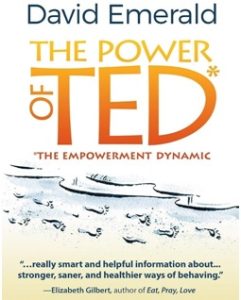BEING A CREATOR! 
“A creator stays focused on a desired outcome, while a victim is focused on problems.” – David Emerald; The Power of TED
(I highly recommend this easy to read book)
VICTIMS long for someone or something to somehow rescue them. CREATORS perceive themselves as being resourceful to create their own path forward.
“While the victim is powerless, a Creator claims and taps into his or her personal power in order to choose a response to life circumstances. Therein lies a Creator’s power to manifest a desired outcome.” – David Emerald; The Power of TED
As PTs we must avoid wanting to be perceived as the rescuer, as this mindset automatically implies the person being rescued (the patient) is the victim.
A Rescuer Mindset PT (RMPT) thrives off of being needed by patients. An RMPT sees patients as powerless victims needing to be saved by a hero… the PT!
A Coach Mindset PT (CMPT) perceives themselves as someone who empowers patients with skills and attitudes that help them uncover solutions on their own.
For an RMPT, interventions are based on THE PTs desired goals (Release fascia, adjust joints, stretch & strengthen muscles, tingling machines, etc.). For a CMPT, focus is on THE PATIENTS’ desired functional goals.
An RMPT breeds dependence. A CMPT cultivates independence.
An RMPT unintentionally disempowers patients through attempts to solve their problems for them. A CMPT is a “constructive challenger” focusing on empowerment.
An RMPT assumes patients are too incompetent to help themselves. A CMPT assumes patients are resourceful, creative and able to help themselves with only some guided facilitation.
An RMPT has the tendency to see patients as broken offering very precise commanding instructions on what they should and should not do. A CMPT does not regard patients as being broken but focuses on the patient’s own reasons for change with focus on acceptance & compassion.
An RMPT often sees it as their responsibility to “fix” patients. A CMPT never says, “Let me fix you”.
An RMPT ensures that their advice is followed to a T using authoritative tactics such as fear, shame or guilt. A CMPT empowers patients to change by drawing out their own meaning, importance and capacity for change.
An RMPT validates the “poor me” identity by focusing on all that is “wrong” with them. A CMPT focuses on the patient’s strengths and on what they CAN do. See my video on this.
As I learn these incredibly valuable concepts, I feel obligated to pass them on and teach their PRACTICAL & CLINICAL applications through my in-person courses. Thank you for reading this.

